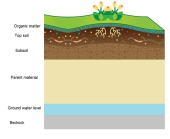
 5
5




 5
5




Good Growing!
 2
2




Demitrios Pitas wrote:What you're looking for is Bokashi composting. You can safely compost meat and bones with bokashi. A quick search will net you plenty of sources and once you have it you can make as much spawn as you like! Hope this nets you what you were after.
Good Growing
 4
4




Critters like rats tend to be attracted to human cooked food, like meat and the bread mentioned below, so depending on your situation and whether you've got natural rat control in the area (AKA Owl People), adding them to compost bins which warm up and provide warm winter rat housing, may not be the best idea. If your yard is big enough that you can dig new holes easily, that seems better, although I've heard very good things about Demitrios' Bokashi suggestion.Ned Harr wrote:I know there are specialized bins and processes for composting those No-No things, but I'm wondering why can't I just dig a deep (>12-inch) hole in my yard and bury the stuff in there? After all, if a bird or a squirrel dies on my property I dig a hole, plop the carcass in, and cover it back up. We buried an expired pet fish that way too. Why should meat and bones leftover from dinner be any different?
I admit I don't worry about small amounts. I gather worms don't like it, but my composts usually have lots of micro-organisms in them, (lots of chicken/duck/goose bedding), so I figure the micros will handle that. I'm not sure if Bokashi micros are good at targeting citrus, but I'm sure a quick search would tell you. Otherwise, I would bury some of it the way you do dead animals.And will the acid from an occasional grapefruit or lemon peel really ruin my compost? (My bin is approximately 1/2 a cubic yard, and is typically about 1/2 full.) How much citrus is too much? Same question for bread.
Visit Redhawk's soil series: https://permies.com/wiki/redhawk-soil
How permies.com works: https://permies.com/wiki/34193/permies-works-links-threads
 6
6




No man is an island.
 4
4




 5
5




 1
1




Invasive plants are Earth's way of insisting we notice her medicines. Stephen Herrod Buhner
Everyone learns what works by learning what doesn't work. Stephen Herrod Buhner
 3
3




 5
5




 2
2




Thom Bri wrote:All that stuff goes on the garden, even bones. Once in a while an opossum might grab a bone. Good for her. Spread it out on the surface rather than concentrating it. No need to overthink every detail.
Good Growing!
 8
8




It's never too late to start! I retired to homestead on the slopes of Mauna Loa, an active volcano. I relate snippets of my endeavor on my blog : www.kaufarmer.blogspot.com
 7
7





 5
5





 4
4




- Tim's Homestead Journal - Purchase a copy of Building a Better World in Your Backyard - Purchase 6 Decks of Permaculture Cards -
- Purchase 12x Decks of Permaculture Cards - Purchase a copy of the SKIP Book - Purchase 12x copies of Building a Better World in your Backyard
 4
4




Moderator, Treatment Free Beekeepers group on Facebook.
https://www.facebook.com/groups/treatmentfreebeekeepers/





 4
4




Education: "the ardent search for truth and its unselfish transmission to youth and to all those learning to think rigorously, so as to act rightly and to serve humanity better." - John Paul II
 2
2




Thomas Dean wrote:We have a seperate compost pile for dog fecal material. Due to parasite concerns and general "yuck" factor, it doesn't get turned, and will never be used in the garden.
 4
4





|
Are you here to take over the surface world? Because this tiny ad will stop you!
Support permies and give beautiful gifts to gardeners: permaculture playing cards.
https://gardener-gift.com/
|



